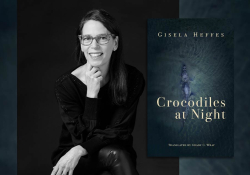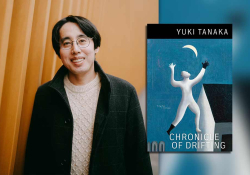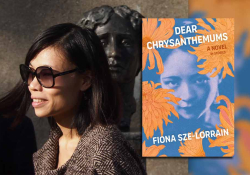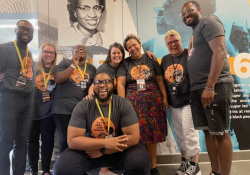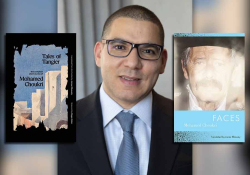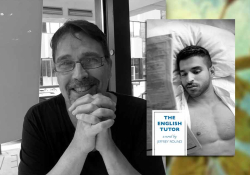Writing Without Permission: A Conversation with Ishmael Reed
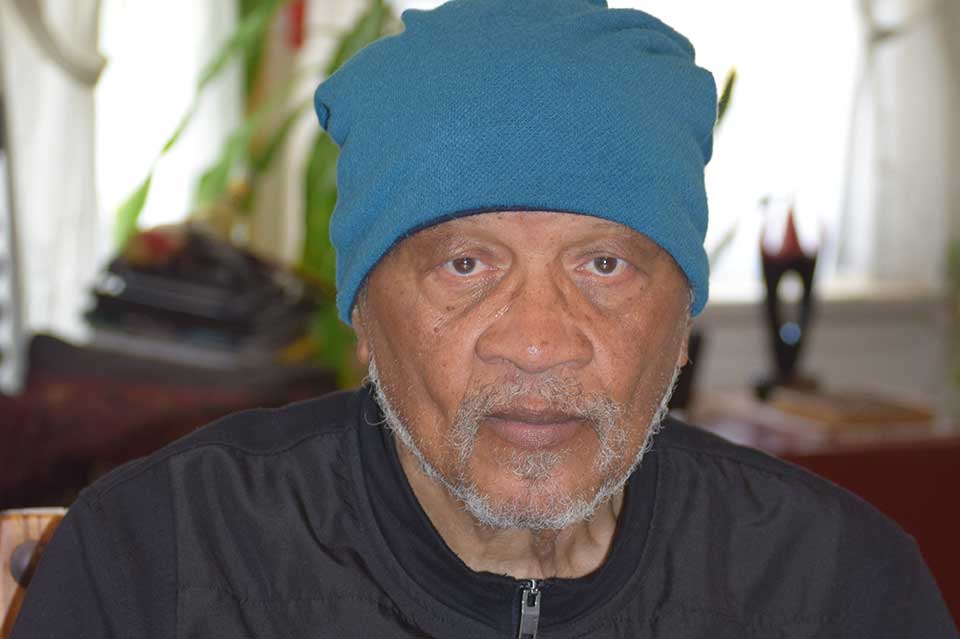
Since becoming a newspaper columnist at sixteen, Ishmael Reed has been a literary force. The author of over thirty titles, including the acclaimed novel Mumbo Jumbo, Reed’s work is marked by what he describes as mischievousness and what I would describe as ever-exciting forms of rebellion. Throughout his career, Reed’s defiance has extended beyond the page as he organized the Before Columbus Foundation, helped establish the revolutionary American Book Awards, and championed young writers who would go on to become best-selling authors. The son of a woman who led successful labor strikes, Reed comes from a family of fighters. In the face of challenges other writers might have found unnerving, he has continued to move forward. We spoke ahead of UC Riverside’s 45th annual Writers Week, where Reed received the Lifetime Achievement Award.
Emily Doyle: I think of your work as challenging literary forms in order to make political, spiritual, and historical realities visible. Your novel Mumbo Jumbo, for example, makes use of newspaper cuttings, party invites, handwritten notes, footnotes, and photographs. The incorporation of these modes seems tied to a statement about the function of literature as a meaning-making, world-shaping force. I’d love to hear from you what you most hope for your writing to do in the world.
Ishmael Reed: You know, I have a different point of view than some other writers because I live in the ghetto. I live in the inner city. For about twenty years or so, we went through drug operations on the block. Occasionally they would blow up into shoot-outs. I had to tell my wife, Carla Blank, who’s a distinguished director-choreographer and author, and my daughter, Tennessee, who’s a prolific poet and manages our magazine, Konch, to stay away from the neighborhood while the two crack houses on the street engaged in gunfire with each other. I have a different perspective from academic and public intellectuals. I have witnessed what Black people in ghettos have to go through from my front porch. So that’s the difference.
Blacks who live here in Oakland have a shorter life span than people in Berkeley or the Oakland Hills. It took my daughter and me two years to get a crack house demolished because of the power of absentee white landlords. And it wasn’t the police, who took bribes from drug dealers, who assisted us. It was a liaison officer whose job was eventually eliminated. This situation would never have been tolerated in the upper-middle-class neighborhood that we lived in before, the El Cerrito Hills. And so, I see one of the motivations for my writing as that of advocating on behalf of those who have no voice, on behalf of the underdog. Black men, for instance, are born underdogs. They are not only marginalized but have been banished from the public forum. They have been cast into America’s lost and found department.
Now, some of the critics say I’m angry. One Times critic said that I’m angry about many things, and they were all crammed into a play that I wrote [Body Parts], which took on the pharmaceutical industry for using Black people as guinea pigs. Well, I also wrote an article about how this pharmaceutical drug contributed to my late daughter’s death. She was a genius and wrote two novels despite having schizophrenia and a mentally ill mother who kept her out of school. One of her novels, Showing Out, was adapted by director Rome Neal for an off-Broadway musical. And now we’re editing a novel that she left us with called Split Into.
I live in a country where elite people who are very privileged can’t possibly understand my point of view. As a result, I get nasty and hostile reviews. I do much better abroad. That’s why I have to try to get a global audience. For example, I wrote a novel called Japanese by Spring, for which I studied Japanese. The people in this country didn’t understand it, but it got rave reviews in Japan and was adopted as a national project in China where I was invited twice. I see myself as a global writer exiled by the mainstream of my country. It’s Black and brown people who have kept my career going.
I see myself as a global writer exiled by the mainstream of my country.
Doyle: You’ve mentioned before that you grew up with people who did not encourage you academically, such as your stepfather and many of your grammar-school teachers. It’s gotten me thinking about the idea of permission to create—both at the hyperlocal levels of our families and neighborhoods, and the societal levels of race and class. How have you navigated the presence or lack of permission?
Reed: I had encouragement from a few teachers, like Hortense Nash in grammar school. She was a Black teacher. The white women teachers saw me as a discipline problem. In eighth grade, I was assaulted by a teacher. She hated me and attempted to land me in the criminal justice system. But I knew enough not to strike back. The music teacher and the principal overruled her. They encouraged my talents.
I think the idea that it is dangerous to read and write was instilled in the Black community. In his book Black Boy, Richard Wright talks about how he had to seek knowledge from books without being caught. He had to go to the library and say he was getting books for his employer. He even had to sneak to read newspapers. And Martin Delany, who was a novelist and officer in the Union army in the nineteenth century, his mother had to flee from Virginia for teaching Delany how to read and write. The southerners realized that reading and writing were powerful technologies. Learning to read and write could get you punished or killed. I think that continues today. People in certain ethnic communities are still discouraged from entering the cerebral arts. There’s a feeling that society will come down upon you. For example, the governor of Virginia just won an election by demonizing Toni Morrison’s novel Beloved.
This fear of Blacks learning to read and write is still a problem. I think it’s the root of tokenism, which only allows for promoting one writer at a time, like James Baldwin.
This fear of Blacks learning to read and write is still a problem. I think it’s the root of tokenism, which only allows for promoting one writer at a time, like James Baldwin. It arises from the racist assumption that Black talent is rare. I have difficulty convincing people that in the time of James Baldwin, there were writers who wrote as well as he did. Women like Gwendolyn Brooks and Margaret Walker, who was probably a better novelist. But Baldwin was in New York and had a lot of backing from a very powerful literary establishment, so he became the token. The New York literary establishment called “The Family” have made tokens out of Blacks for over one hundred years.
When people study Baldwin, they end with The Fire Next Time. But if you go further into his career, you will find that he stopped redeeming liberals, became very disillusioned and bitter, and wrote a novel called Tell Me How Long the Train’s Been Gone where he bites the hand that fed him. In Tell Me How Long, Baldwin repudiates his sponsors. In return, they came down on him. Mario Puzo did the hatchet job in the New York Times Book Review, which at the time had the power to make or break a writer. If you are ungrateful to “The Family,” they will retaliate.
Doyle: How have you rebelled against this idea of permission within your work, especially when it comes to the literary establishment?
Reed: I had wonderful mentors. I accidentally became a newspaper columnist when I was sixteen. The editor was A. J. Smitherman. I didn’t know that Smitherman had fled from Tulsa, Oklahoma, because he was one of the people the mob sought after the Tulsa riots of 1921. Smitherman believed in militant self-defense. He and other armed men would interrupt lynchings. And one time, he interrupted a lynching by himself, unarmed. During the Tulsa riot, they burned down his home and his publishing house. He had to flee to Boston with his family. Then he went to Buffalo, New York, where I worked for him. I didn’t know about his history until years later. But he gave me a column when I was sixteen, so I was encouraged. Then I met Malcolm X. I wrote about that experience in Malcolm and Me.
Doyle: You say in Malcolm and Me that you were fascinated by Malcolm X’s contradictions. I think humans are inherently contradictory creatures. Do you agree? If so, what are your contradictions?
Reed: That’s an interesting question. Nobody’s asked me that before. I have to think about that. Somebody wrote me a note recently asking why I’m against the establishment when I’m also a part of the establishment. So that might be considered a contradiction.
And when I was honored with prizes like nominations for the National Book Award and given the Rosenthal Prize from the National Institution of Letters, they asked me why I was organizing the Before Columbus Foundation and the American Book Awards when I was already part of the establishment. They asked, “Why aren’t you satisfied?” I said, “Well, others write very well, and they should be recognized too.”
I’ve been editing anthologies since 1969. I was aware of the range of talent that’s out there. And I was also aware that they were trying to make me into a token. That’s one of the reasons I left New York. When I came to the West, I discovered other writers and published them. I published my students. For example, Terry McMillan is a best-selling writer and was my former student. I published Mona Simpson when she was a student. She’s now the publisher of the Paris Review. Until I took her manuscript to Langston Hughes, my dear friend Lucille Clifton was a housewife living in Buffalo. He published her in his anthology Poetry of the Negro. In 1974 I was the first to publish an excerpt from Ntozake Shange’s For Colored Girls Who Have Considered Suicide / When the Rainbow Is Enuf. I’ve published dozens of Black women over the years, and they’ve been honored by the two foundations I established. I’ve published Native American and Asian American women writers. And the latest issue of my magazine, Konch, includes twenty-three women. It’s a special issue, a tribute to Miguel Algarin.
Until I took her manuscript to Langston Hughes, my dear friend Lucille Clifton was a housewife living in Buffalo.
Also, in my eleven plays I’ve created roles for Black women that challenge them, not the kind that are offered to them by television, film, and theater—the roles of drug mules, prostitutes, and maids. Contributors to the anthology Bigotry on Broadway, edited by Carla Blank and me, tackle these stereotypes.
Doyle: In Gathering Blossoms under Fire, Walker claims that your mother took you to visit your father’s office when you were a little boy and that your father threw you out. She also says this story “explains [Ishmael’s] hatred of Black women writers: we keep taking them to meet his father.” Do you have a response to this?
Reed: It’s completely false. That event never took place. My mother never took me to my father’s office where my father then threw me out. And more importantly, I believe in Black women writers; I don’t hate them. Like I said before, throughout my career I’ve published dozens of Black women writers who were unknown at the time, and my last four awards came from organizations that are run by Black women. The claim that I hate Black women writers is a lie.
Doyle: Can we expect an essay or article from you addressing these issues more fully?
Reed: Yes, I’m working on a piece now.
Doyle: You mentioned previously that you’ve published the work of students like Terry McMillan and Mona Simpson. What about your students and their work stood out to you at that time?
Reed: They wrote as well as anybody in the canon. When I created the anthology From Totems to Hip-Hop, I said, “Why don’t I put some of my students in here along with these canonized writers?” And so I did.
I went to the National Council of Teachers of English and read a poem by a student and a poem by a canonized writer. I asked them, “Which is the canonized writer, and which is the student?” They said the student was the canonized writer and the canonized writer was the student. That showed me that canonization formation is arbitrary.
Doyle: I would call that a radical act. Would you agree?
Reed: Well, you know, it’s probably mischievous. This business is so grim that I like a lot of humor.
I guess that’s why my last five to six books have not been reviewed by the New York Times Book Review. I wrote a series—The Terrible Twos, The Terrible Threes, and The Terrible Fours—as an elliptical reading of the zeitgeist since Reagan. And I wrote Conjugating Hindi, for which I studied Hindi. These books have been ignored here, but they do very well in Canada. And a play I wrote, Mother Hubbard, was produced at an international literary conference in Xiangtan, Hunan province.
Doyle: I’m curious about how humor functions in your work and if it is perhaps an act of rebellion against some of these strictures you’ve identified in the publishing world, in the awards world, and maybe even in the academic world.
Reed: My novel Japanese by Spring is a spoof on academia. I would call it “serious comedy.” In Jamaica, there is a literary genre called “serious comedy” where you make important points but use humor, which is also part of the Black tradition in this country. I’m part of a tradition. The problem is that most Eurocentric scholars don’t know the tradition.
My style of writing has the same root as hip-hop. The “toasts,” which were rhymes that were often scatological, arose from the criminal underworld in the early part of the 1900s. The two most famous toasts are “And Shine Swam On” and “The Signifying Monkey.”
Doyle: You’ve been prolific throughout your career, authoring more than thirty works. And yet you’ve described during our conversation the many challenges you’ve overcome. What has sustained you? Do you have an inherent desire to continue to push against these forces you’ve faced?
Reed: I come from a family of Tennessee fighters. Like my mother, who was abandoned and had to make do with her skills. She organized two strikes. One of the strikes was of the maids at a hotel in Buffalo. The other was at a department store, where the Black women were assigned to do stock work and the white women were salespersons. She became the first Black salesperson as a result of the strike. She wrote a book I deeply admire called Black Girl from Tannery Flats. But when she died, her achievement was that she became a salesperson. She was a fighter.
We’re from Tennessee, so we’re ornery. I think that’s what sustains us. I’m very ornery. I just keep busy and keep pushing.
Doyle: How have you maintained a connection to your writing throughout your career? Have your avenues of connection changed?
Reed: I never get writer’s block because I work in several genres. For example, one of the editors for Audible got me to write short stories. I never thought I'd be writing short stories. When crocodiles become old, they become vegetarians. Now I’m writing short stories.
Doyle: Can you tell me about them?
Reed: Audible published “The Fool Who Thought Too Much.” It’s about the struggle between court fools and the Enlightenment leaders in 1700s Germany. The court fools had status and free speech. They could tell off the king. When the leaders of the Enlightenment said everyone should have free speech, there were cultural and philosophical clashes between the court fools and those leaders. That’s what this short story’s about.
In November, Audible will publish “The Man Who Was Not Himself,” which is about a Black neuroscientist. He’s not a drug dealer. He’s not a bling blinger, which is a stereotype you get on TV. In my stories, I want to challenge the mass media and the pro-Anglo school curriculum, which do not present the number of careers available to Black kids. I heard a Black woman speak who had become an advocate of oceans. She said that if she had learned in school that the profession was available to her, she would have become a marine biologist. I also heard a Black astrophysicist say that when he appeared before a class of Black students, they bombarded him with questions. They weren’t aware that the profession was open to them.
I’m also venturing into horror and sci-fi with my short stories. In November, a short story of mine will appear in an anthology about the plague, edited by Margaret Atwood. My other works are reaching new audiences, too. On May 3, Dalkey published Yellow Back Radio Broke-Down, which was first published in 1969. In November, Scribner will publish a special fiftieth- anniversary edition of Mumbo Jumbo. In September, the African-American Shakespeare Company will produce The Slave Who Loved Caviar, which originally ran three weekends at the Theater for the New City in New York. And a reading of my new play The Conductor, about the San Francisco school board recall election, will be given a staged reading at Theater for the New City from October 13–16. This play covers material that the official press missed, so down are they on a “wokeness” they can’t define.
Doyle: We’ve talked about the ways in which your writing has been rooted in appropriate anger. On the flip side, I’m curious about what in your writing has brought you joy.
Reed: I think some of my writing has influenced people. People say some of my books have changed their lives. I mean, that’s interesting.
I get great satisfaction in putting words together and solving problems, going from step A to step B, making transitions, creating characters, and taking on institutions.
Doyle: How should younger writers navigate this world? Do you have any advice for those writers?
If they tell you not to read books, read them. Find out what they’re worried about.
Reed: You have to ignore my generation, which will be off the scene soon, fortunately. You have to be intellectually curious, especially when people tell you not to read books. Four hundred books were banned in the South. You should read those books. If they tell you not to read books, read them. Find out what they’re worried about.
I think younger writers have to show a lot of intellectual curiosity. I’ll end with an anecdote. A student once wrote on the blackboard of my classroom, “Dinner with Professor Reed, bring your own watermelon.” I knew who this student was, but I didn’t let on. I said, “If I find out who this person was, I’ll inform the dean, and they’ll be expelled.” He came to my office before the quarter was over and said he’d done it. I said, “I’m not going to report you to the dean. I want you to go and work at a Black Repertory Theater.” So, he accepted that. He spent ten weeks at this Black theater, working with Black producer Nora Vaughn, who, with her husband, was run out of Mississippi by the Klan for presenting plays there. He also worked with the great Black director and playwright Ed Bullins. I went to see a play they had produced. My student was supposed to be working with the crew. Well, Ed Bullins had given him a role in the play. I don’t know where that kid is now, but I’m sure that’s an experience he will never forget. And I think for white writers, they have to reach out. They should reach out to nonwhite institutions—such as Black, Native American, and Asian American institutions—instead of learning about people unlike them from TV and movies.
February 2022
When you buy a book using our Bookshop Affiliate links on this page, WLT receives a commission. Thank you for your support!
 Ishmael Reed is the founder of the Before Columbus Foundation and PEN Oakland, both nonprofit organizations run by writers for writers. His honors include a MacArthur Fellowship, a University of California Distinguished Emeritus Award, a University of Buffalo Distinguished Alumni Award, a National Book Award, a Lila Wallace–Reader’s Digest Award, four AUDELCO Awards, San Francisco LitQuake’s Barbary Coast Award, a Lifetime Achievement Award from the Los Angeles Review of Books and University of California Riverside, and two Pulitzer Prize nominations. Recipient of a Blues Songwriter of the Year Award from the West Coast Blues Hall of Fame, Reed was also appointed San Francisco’s first Jazz Poet Laureate by the SF Jazz Center. He became the first Alberto Dubito International awardee in Venice, Italy, honored as “a special artistic individual who has distinguished himself through the most innovative creativity in music and language.” A poet, novelist, essayist, playwright, songwriter, public media commentator, lecturer, publisher, and author of more than thirty books, he taught for over thirty-five years at the University of California Berkeley. He was honored as their 2020 Emeritus Professor of the Year. This year he received the Anisfield-Wolf Award for Lifetime Achievement and was elected to the American Academy of Arts and Sciences. He is now a distinguished professor at California College of the Arts.
Ishmael Reed is the founder of the Before Columbus Foundation and PEN Oakland, both nonprofit organizations run by writers for writers. His honors include a MacArthur Fellowship, a University of California Distinguished Emeritus Award, a University of Buffalo Distinguished Alumni Award, a National Book Award, a Lila Wallace–Reader’s Digest Award, four AUDELCO Awards, San Francisco LitQuake’s Barbary Coast Award, a Lifetime Achievement Award from the Los Angeles Review of Books and University of California Riverside, and two Pulitzer Prize nominations. Recipient of a Blues Songwriter of the Year Award from the West Coast Blues Hall of Fame, Reed was also appointed San Francisco’s first Jazz Poet Laureate by the SF Jazz Center. He became the first Alberto Dubito International awardee in Venice, Italy, honored as “a special artistic individual who has distinguished himself through the most innovative creativity in music and language.” A poet, novelist, essayist, playwright, songwriter, public media commentator, lecturer, publisher, and author of more than thirty books, he taught for over thirty-five years at the University of California Berkeley. He was honored as their 2020 Emeritus Professor of the Year. This year he received the Anisfield-Wolf Award for Lifetime Achievement and was elected to the American Academy of Arts and Sciences. He is now a distinguished professor at California College of the Arts.


